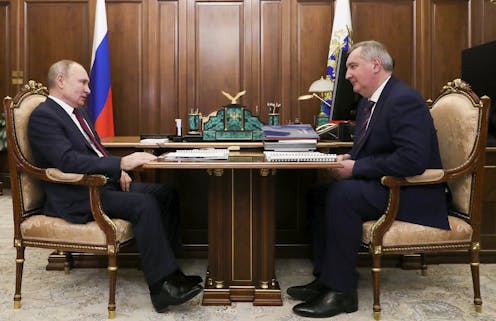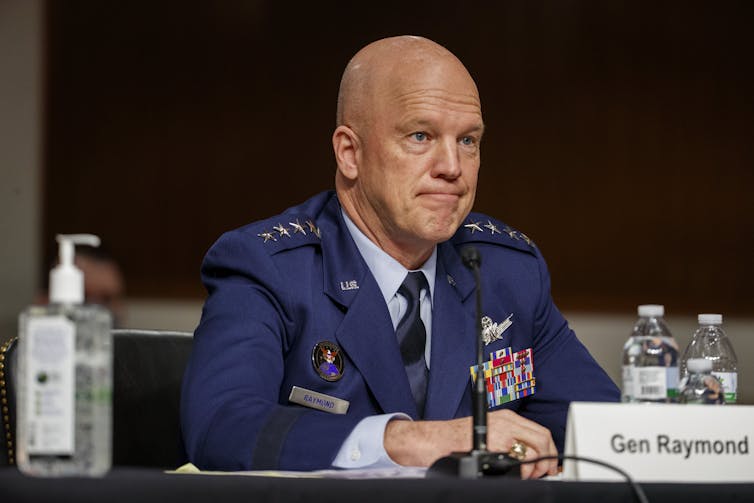
On Feb. 19, 2022, an Antares rocket took off with the Cygnus cargo capsule to resupply the orbiting International Space Station (ISS) currently crewed by American, Russian and German astronauts. The rocket is partly Ukrainian-built and partly American-built, and powered by engines made in Russia. The Cygnus cargo capsule is manufactured with components from all over Europe.
Like many space missions, this one shows that countries can come together and co-operate to accomplish great advancements in the exploration and use of outer space.
Five days after the launch of Antares, Russia launched a military invasion of Ukraine, which the United Nations General Assembly overwhelmingly voted to condemn “in the strongest terms” as aggression and a flagrant violation of the UN Charter. The invasion of Ukraine triggered shockwaves across the globe — these can also be felt in outer space.
Read more: Why did Russia invade Ukraine? FAQs about the conflict that has shocked the world
Russian collaboration
Countries around the world jumped to sanction Russia and the Putin regime. The United States sanctions are specifically aimed to “degrade [the Russian] aerospace industry, including their space program.”
In response to widespread and hard-hitting sanctions, the director of the Russian space agency Roscosmos reminded the world that sanctions may affect the operation of the Russian propulsion systems that keeps the ISS afloat, and potentially cause the 420-tonne station to come crashing down over Europe, China, India or the U.S.
Roscosmos has suspended all space co-operation with European partners and launches conducted from the European Spaceport at Kourou, French Guiana.
The planned Venera-D mission with NASA is now off the table, while the joint Roscomos-European Space Agency ExoMars mission will now be indefinitely postponed.
The planned launch of the OneWeb satellites — that require a Russian Soyuz rocket — also appears to be in jeopardy. Russia has demanded that the United Kingdom guarantee that the satellites would not be used for military purposes, and required the U.K. government sell its stake in the company. OneWeb has refused these terms, and is currently working on alternatives.
Threats to space security
The Russian invasion is not the only impending issue to have detrimental impacts on space co-operation. Ongoing multilateral efforts to address growing threats from Russia to space security have been derailed. With tensions at their highest in the post-Soviet era, it is now even more unlikely that countries will be willing to work with Russia to reduce space threats through norms, rules and principles of responsible behaviours.
All this comes just months after Russia conducted an anti-satellite missile test that endangered every user of outer space. China, similarly, tested anti-satellite lasers and ground-breaking hypersonic missiles in space.

Tensions on Earth may very well extend into and have great implications for what happens in outer space. A war in space would have catastrophic consequences for everyone, and the devastation and its impact on civilian lives and societies would be unimaginable.
Outer space and modern warfare
The conflict in Ukraine has again highlighted how indispensable space and space applications are to modern life and modern warfare. Remote sensing images acquired from commercial firms can provide real-time data to assist humanitarian relief efforts. Gathered information can be used to address disinformation, monitor the impact of armed conflict on the natural environment and observe military activity well in advance of a conflict.
On the other hand, the ability of global navigation satellite systems to triangulate the exact location of a mobile phone make civilians or reporters vulnerable to attack. The same satellite positioning system can also assist armed forces in striking against civilian infrastructure like communications towers, power plants and even schools and hospitals.
The U.S. military operates the Global Positioning System (GPS), which may be susceptible to attack in the armed conflict in Ukraine. This could potentially cause many to lose the ability to navigate safely and cripple the global financial system, which relies on GPS to register and timestamp transactions, among other uses.
The outbreak of war on Earth shows that, in order to preserve the safety, security and sustainability of outer space, governments and stakeholders need legal clarifications on what they can and cannot do in this unique global commons.
Back to Earth
Satellites orbiting the Earth have also been involved in the war effort beyond recording information. SpaceX has been quick to deliver Starlink terminals to Ukraine to alleviate internet outages caused as a result of the Russian attacks.
Despite the outbreak of war, there is still a glimmer of hope that co-operation will persist in space. Despite strained relations and sanctions, the Russian space agency continues to work with its counterparts in the operation of the ISS.
In over 65 years of space exploration, Russian cosmonauts have flown on American spacecraft, while astronauts from the U.S. and other countries have relied on Russian spacecraft to access space. There is no indication that this mutually beneficial relationship will cease.
Indeed, space co-operation has been an enduring hallmark of how countries can come together despite political differences and disagreements. Even at the height of the Cold War, the U.S. and Soviet Union agreed to the 1963 Partial Test Ban Treaty, which prohibits the testing of nuclear weapons in outer space, and the 1967 Outer Space Treaty, which lays down fundamental principles for the exploration and use of space.
At the time, although the U.S. and Soviet Union were at loggerheads, astronauts from both sides shook hands in space after the Apollo-Soyuz docking, a historic moment hailed as “opening back on Earth an era in the history of man.”
Considering the growing need to promote multilateralism and international co-operation, it is hoped that tensions will subside and international peace can be brokered, on Earth as well as in space.
The authors do not work for, consult, own shares in or receive funding from any company or organisation that would benefit from this article, and have disclosed no relevant affiliations beyond their academic appointment.
This article was originally published on The Conversation. Read the original article.







